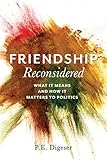Friendship Reconsidered : What It Means and How It Matters to Politics / P. Digeser.
Material type: TextPublisher: New York, NY : Columbia University Press, [2017]Copyright date: ©2016Description: 1 online resource (392 p.)Content type:
TextPublisher: New York, NY : Columbia University Press, [2017]Copyright date: ©2016Description: 1 online resource (392 p.)Content type: - 9780231174343
- 9780231542111
- 320.01 23
- JA71 .D52135 2016
- JA71 .D52135 2017
- online - DeGruyter
- Issued also in print.
| Item type | Current library | Call number | URL | Status | Notes | Barcode | |
|---|---|---|---|---|---|---|---|
 eBook
eBook
|
Biblioteca "Angelicum" Pont. Univ. S.Tommaso d'Aquino Nuvola online | online - DeGruyter (Browse shelf(Opens below)) | Online access | Not for loan (Accesso limitato) | Accesso per gli utenti autorizzati / Access for authorized users | (dgr)9780231542111 |
Browsing Biblioteca "Angelicum" Pont. Univ. S.Tommaso d'Aquino shelves, Shelving location: Nuvola online Close shelf browser (Hides shelf browser)

|

|

|

|

|

|

|
||
| online - DeGruyter The Gnostic New Age : How a Countercultural Spirituality Revolutionized Religion from Antiquity to Today / | online - DeGruyter Horses, Horses, in the End the Light Remains Pure : A Tale That Begins with Fukushima / | online - DeGruyter Love in the Dark : Philosophy by Another Name / | online - DeGruyter Friendship Reconsidered : What It Means and How It Matters to Politics / | online - DeGruyter Negotiating Languages : Urdu, Hindi, and the Definition of Modern South Asia / | online - DeGruyter Broken Tablets : Levinas, Derrida, and the Literary Afterlife of Religion / | online - DeGruyter The Miracle Myth : Why Belief in the Resurrection and the Supernatural Is Unjustified / |
Frontmatter -- Contents -- Acknowledgments -- Introduction -- Part One -- 1. Friendship as a Family of Practices -- 2. Motivations, Actions, and The Value of Friendship -- 3. Self- Interest, Duty, and Friendship -- 4. Friendship and Individuality -- Part Two -- 5. Civic Friendship -- 6. Friendship During Dark Times -- 7. Institutions for and Against Friendship -- Part Three -- 8. Friendship and Friend in an International Context -- 9. International Friendships of Character -- 10. The Politics of International Friendship -- Notes -- Bibliography -- Index
restricted access online access with authorization star
http://purl.org/coar/access_right/c_16ec
In the history of Western thought, friendship's relationship to politics is checkered. Friendship was seen as key to understanding political life in the ancient world, but it was then ignored for centuries. Today, friendship has again become a desirable framework for political interaction. In Friendship Reconsidered, P. E. Digeser contends that our rich and varied practices of friendship multiply and moderate connections to politics. Along the way, she sets forth a series of ideals that appreciates friendship's many forms and its dynamic relationship to individuality, citizenship, political and legal institutions, and international relations. Digeser argues that, as a set of practices bearing a family resemblance to one another, friendship calls our attention to the importance of norms of friendly action and the mutual recognition of motive. Focusing on these attributes clarifies the place of self-interest and duty in friendship and points to its compatibility with the pursuit of individuality. She shows how friendship can provide islands of stability in a sea of citizen-strangers and, in a delegitimized political environment, a bridge between differences. She also explores how political and legal institutions can both undermine and promote friendship. Digeser then looks to the positive potential of international friendships, in which states mutually strive to protect the just character of one another's institutions and policies. Friendship's repertoire of motives and manifestations complicates its relationship to politics, Digeser concludes, but it can help us realize the limits and possibilities for generating new opportunities for cooperation.
Issued also in print.
Mode of access: Internet via World Wide Web.
In English.
Description based on online resource; title from PDF title page (publisher's Web site, viewed 02. Mrz 2022)


